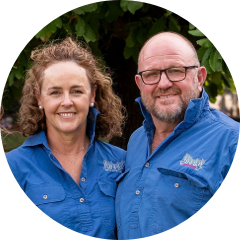Companion cropping legumes for lower cost nitrogen supply in farming systems
Term
2024-2027
Project Officer
Jane McInnes
WHY THIS PROJECT IS IMPORTANT
Grain growers have identified their increasing reliance on inorganic fertiliser nitrogen (N) for crop production and are looking at innovative ways of reducing synthetic nitrogen inputs.
Riverine Plains is testing nitrogen fixation in companion cropping scenarios at different desiccation timings. This will establish the impact of nitrogen-fixation to the farming system and investigate the costs associated with sowing and desiccation.
Australian wheat production currently sits at around 30 million tonnes annually, which requires an estimated 1.2 million tonnes of nitrogen to be supplied from the soil. Currently a bit less than half of this nitrogen is supplied by synthetic nitrogen fertilisers and grain growers are increasingly looking for new, affordable and more environmentally friendly ways to manage their nitrogen supply.
One established approach is to incorporate legumes in the farming systems – this adds nitrogen to the soil in organic form that is later mineralised and taken up by subsequent non-leguminous crops. However, this approach requires the dedication of a full-year of winter crop production to the pulse crop, which can be challenging given many growers grow pulses one-in-six years, while others remain reluctant to grow pulses at all.
A different approach involves sowing a companion legume (e.g. vetch), every year together with a non-leguminous crop, with the companion legume terminated by desiccation before it impacts on the yield of the main crop.
Project focus
A demonstration trial has been established at Sanger, in southern NSW, to investigate the amount of nitrogen fixed by leguminous companion crops (vetch) and the optimal timing of their desiccation (termination). An economic analysis will also be produced, comparing returns of different companion crop desiccation timings.
This project has three main areas of focus:
- Reduced synthetic nitrogen dependence: This project is supporting farmers to look at practical alternatives to reduce the use of synthetic nitrogen fertilisers, promoting environmentally friendly solutions without compromising crop yields
- Enhanced nitrogen mineralisation: The project focuses on increasing nitrogen mineralisation in the soil by integrating legumes into farming systems, improving soil fertility and nutrient availability
- Sustainability and profitability: By promoting the integration of legumes into the rotation, the project aims to boost both the long-term sustainability and profitability of crop production, ensuring healthier soil and more resilient farming practices
Project outcomes
Interim results from the project have been published in Research for the Riverine Plains, 2025, with the article describing the impacts of different vetch termination timing on soil nitrogen, biomass and yield.
Key messages from the trial were that:
- At a replicated trial site established at Sanger during 2024, there were no significant differences in nitrogen levels at anthesis between wheat sown on its own in a monoculture and wheat sown with vetch in a companion crop.
- There were no significant differences in wheat yield or quality when grown in a monoculture compared to being grown as a companion crop with vetch, except when the companion crop with 50 percent nitrogen was terminated in September, which yielded significantly less.
- Vetch and wheat biomass increased as the season progressed, however vetch biomass was highest at the September termination, while wheat was highest at the October termination, suggesting wheat was better able to compete for resources.
- Vetch biomass production was relatively low when sown as part of a companion cropping mix with wheat, likely due to factors relating to the dry season, as well as competition by the wheat.
- The estimated nitrogen benefit of the vetch varied between 0.4 kg–6 kg N/ ha, with the highest nitrogen benefit occurring at the end of September.
- Vetch sown in a monoculture yielded poorly in this trial (approximately 0.1 t/ha), likely due to seasonal conditions.
Find out more
For further information, please email Riverine Plains Senior Project Manager, Jane McInnes at jane@riverineplains.org.au.
Project investment
NGN - Companion cropping legumes for lower cost nitrogen supply in farming systems is an investment of the Grains Research and Development Corporation.
GRDC's National Grower Network (NGN) refers to the community of growers and grains industry stakeholders across Australia’s growing regions who GRDC engages directly with to assist in developing locally relevant research development and extension (RD&E) investments.
Focus areas
MORE ON Grains & Sustainability
Our research enhances food production, increases environmental resilience and improves community connection across the Riverine Plains. See how our research creates impact.
-
Grains
Sustainability
-
Business
Sustainability
-
Livestock
Sustainability
-
Grains
Business
-
Grains
Livestock
-
Grains
Livestock
-
Soils
Sustainability
-
Soils
Sustainability
-
Grains
Sustainability
-
Grains
Business
-
Sustainability
Drought
-
Sustainability
-
Grains
Sustainability
-
Grains
-
Grains
-
Soils
Grains
-
Soils
Sustainability
-
Grains
Soils
-
Drought
Grains
-
Soils
Grains
-
Grains
-
Grains
Soils
-
Soils
Grains
-
Fodder
Grains
-
Grains
-
Soils
Sustainability
-
Grains
-
Soils
Sustainability
-
Grains
Soils
-
Sustainability
Grains
-
Grains
Sustainability
-
Soils
Grains
-
Grains
Sustainability
-
Livestock
Grains
-
Grains
Soils
-
Sustainability
Grains
JOIN RIVERINE PLAINS
Riverine Plains provides opportunities to see new research and innovation, connect with rural communities, and attend informative events.


